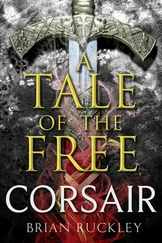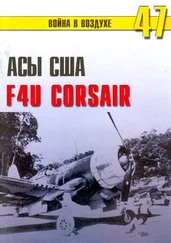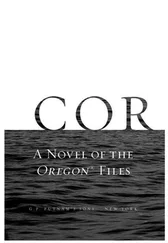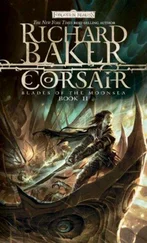Hector looked around him. Amidships the galley was entirely underwater. Only the poop deck and the rambade were above the waves. The rambade was only a few paces away. Hitching up his leg chain to his belt hook, he shuffled on to it.
‘What do we do now?’ asked Bourdon, looking at the distant shore. ‘It’s too far to swim. Our leg irons will drag us down. They’ll be the death of us.’
‘Not if you do as I show you.’ It was Dan who spoke. He crossed to where the empty gunpowder kegs were still lashed in place. Selecting a barrel, he unbuckled his heavy galerien belt, wrapped it around the keg, and cinched it tight. ‘Hold the barrel in your arms, sideways like this, and jump overboard. When you’re in the water, make sure you get the centre link of your leg chain on to the belt’s hook. Then push down with both feet. It’ll be like riding in stirrups. The barrel should take your weight. Don’t try to swim, just concentrate on staying upright, clutching the barrel, and the wind and waves will carry you ashore.’
With that, he jumped into the sea, holding the barrel against his chest.
Hector watched his friend come back to the surface, the keg in his arms dipping this way and that, spinning and turning in the water so that one moment Dan was on the surface, the next he was beneath the sea. But soon Dan had found his balance and could be seen leaning forward across the keg, with his face far enough out of the water so that he could breathe. The barrel gyrated slowly as it drifted towards the shore. ‘Come on. Hurry!’ he shouted back at his companions, and one after another they leaped into the sea.

IRGUN DID NOT reach the shore. Perhaps he was too heavy to be supported by an empty keg or it filled with water and sank, or he failed to secure his leg chain on the belt hook. But Hector, Bourdon and Karp drifted into the shallows where Dan was waiting to assist them on to land. ‘What made you think of that?’ asked Hector. He was shaking with exhaustion as he sat down on the beach to rest. ‘Our canoes at home,’ said the Miskito. ‘I told you how we turn them the right way up after they capsize. But it’s not always possible. So if the wind and waves are right, a sensible fisherman just hangs on and waits until he is blown ashore. That’s if the sharks don’t take him.’
‘I’ve never seen a shark. If there are any in this region, they’ll soon be feasting on those poor wretches,’ said Hector. He was looking back towards the galley. All that was now visible of the St Gerassimus was a section of the outrigger which had once supported her great sweeps and the blades of several oars pointing to the sky like enormous spines. The galley must have capsized while he and the others were coming ashore. That way, he thought to himself, the galeriens chained on board would have drowned more quickly than if the vessel had settled on an even keel. He had scarcely known any of them, yet a sense of great weariness and gloom oppressed him.
A touch on his arm abruptly brought him back to his surroundings. Karp was pointing up the beach and making an alarmed snuffling sound. A man was walking towards them. For a moment Hector thought he might be another survivor from the wreck, because he was wearing what looked like a galerien’s long hooded cloak. But the stranger’s garment was loose and grey, not brown. Then he saw other men, similarly dressed, cautiously making their way down the rocky hillside behind the beach.
‘Greetings,’ Hector called out, getting to his feet and forcing a weary smile. He spoke first in lingua franca, then in Turkish, but received no answer.
The group of strangers, about a dozen men, came closer, and stopped a few yards away. They were Moorish-looking but with paler skins. Most kept up the hoods of their cloaks, but those who did not, had shaven heads except for a long lock of hair which hung down the back of their scalps. They wore thin fillets of leather across their foreheads. Only a few carried old-fashioned muskets. They stared at Hector and his companions.
‘Greetings,’ he tried again. ‘Can you help us, please?’
One of the strangers said something to his companions in a language Hector did not understand.
Then, to Hector’s surprise, Dan intervened. He spoke slowly and haltingly, choosing his words carefully. The man who seemed to be the leader of the group replied and the two of them exchanged a few sentences.
‘Who are they?’ Hector asked his friend. ‘And what is that language you are speaking?’
‘They call themselves amazigh, “the free people”, Dan replied. ‘Several of the gardeners who worked with me in the gardens of Algiers spoke the same language, or something very similar. I can’t understand everything they say, but they are from a village in the hills. Apparently they saw the galley in difficulties and came down to the beach to investigate if there was anything to salvage. They were frightened of the armed men who came ashore earlier in the boats so they kept out of sight.’
‘That must have been Piecourt with the ship’s officers and the other sailors.’
‘Apparently they went off along the beach, and turned inland. The amazigh said that they won’t get far. Their clan chief lives in that direction and they’ll fall into his hands.’
‘So what about us?’
‘They’ve recognised that we are slaves from the galley, and I’ve told them that you and I are Muslims. If they’re like my workmates at the masseries, they’re also followers of the Prophet.’
‘What about Bourdon and Karp?’
‘I didn’t say anything about them. The amazigh seem friendly enough. They’re taking us to their village. Once we’re there, they’ll get the village blacksmith to remove our leg irons.’
The climb through the foothills was almost more than the four castaways could manage. The land rose steeply, one rocky slope succeeding another, the narrow footpath twisting and turning its way along dried-up watercourses and then up screes of fallen rock. Occasionally they passed clumps of pine trees, and beside the track Hector noted plants he remembered from his days in Algiers – wild lavender, purple thyme and white rock roses. Eventually, when the sea was far below them, their guides led them into a small settlement made up of single-storey houses, their walls of unmortared stones. In the centre of the village a mountain spring had been diverted through wooden pipes to splash into a stone trough placed in the shade of a venerable cedar tree. Here the village blacksmith knocked out the rivets that closed the ankle rings on the visitors’ legs, demanding no payment except that he keep the metal for himself, and the village headman asked Dan to go with him the following day to meet with the clan’s council of elders. They would decide what was to be done with the castaways. In the meantime they were his guests.
Dan and the headman left long before daybreak, and Hector and Karp waited all morning for his return, seated in the village square and watching Bourdon entertain the village children with sleight of hand, making pigeon eggs and other small objects appear and disappear. Trying to remember what he had learned from Turgut Reis’s maps and charts, Hector broke off a twig and was drawing in the dust so that he could work out where St Gerassimus had sunk. He had made a rough outline of the Mediterranean when, unexpectedly, Karp took the twig from his hand and scratched a mark to the north of Constantinople, then pointed to his chest
‘Is that where you come from, Karp?’ Hector asked. His companion nodded, then clumsily drew some letters in the dust. Hector managed to puzzle them out.
‘You are a Bulgar?’ he asked. Again Karp nodded, and held out his hands, the wrists close together. ‘You were taken prisoner?’ Again the nod. ‘Where was that?’ Karp looked down at the map in the dust and, hesitantly, placed his finger at its eastern end. ‘In the Holy Land?’ This time Karp shook his head, and drew some more letters in the dust. They read ‘Kan—’. Hector stopped him. ‘You were taken prisoner at Kandia?’
Читать дальше









